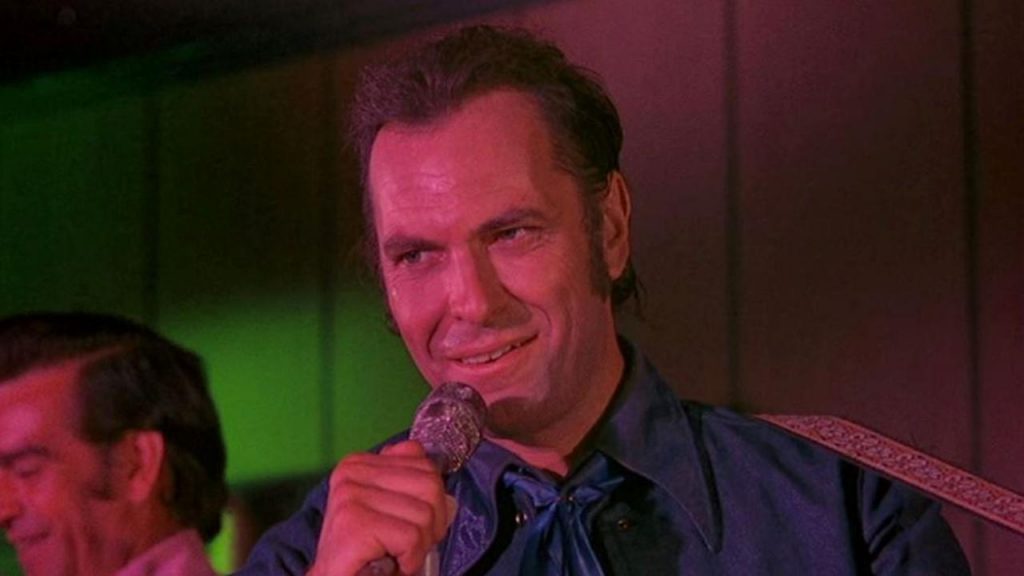
Payday (1972) is one of those unique films produced in the early seventies by the big studios when they were looking to cash in on the youth audience and willing to give first time movie makers a chance. Like so many of these films, Payday’s narrative is constructed around a road trip; or rather a tour of the American south as country singer Maury Dann (played by Rip Torn) promotes his new single Payday. Unlike the protagonists of other early seventies road movies such as Coppola’s The Rain People (1969), Hellman’s Two Lane Black Top (1971) and Loden’s Wanda (1970); Maury Dann is not a man in search of himself, his country, or even in some abstract existentialist meaning, but is instead desperate to make the break into the big time, a break that he knows he is incredibly close to. In this way the protagonist of Payday is not a character derivative of America’s youth but it’s greed, it’s capitalist impulse. Dann represents opportunism, chauvinism, and egotism, the three primary characteristics that the S.D.S. attributed to those people over thirty, to the people who didn’t “buck the system” or stand up to “the man”. So though stylistically speaking Payday fits right alongside its contemporaries aesthetically, it’s content perverts that style creating a sort of antithesis to Hopper’s Easy Rider (1969).
Payday is the product of collaboration between novelist Don Carpenter and Canadian film director Daryl Duke. Carpenter’s work as a novelist, particularly his first novel Hard Rain Falling (1966), was dedicated to the exploration of those people who live along the margins of society, often itinerant and closed off emotionally. In this repertoire of characters Maury Dann fits quite easily. Dann has no fixed home, living out of a car while on tour, scraping by just enough to support his invalid mother and indulge in excessive drinking and womanizing. What Daryl Duke brought to the picture was years of experience as a producer for CBC Television in Vancouver. Duke could shoot quickly and cost effectively without jeopardizing the level of professionalism on the production.
But the most important player would be the actor cast as Maury Dann, Rip Torn. Torn had been acting on and off Broadway since the early sixties and had transitioned onto the screen with starring roles in such critically acclaimed films as Nicholas Ray’s King Of Kings (1961), Richard Brooks’ Sweet Bird Of Youth (1962), Milton Moses Ginsberg’s controversial Coming Apart (1969), and more infamously in Norman Mailer’s Maidstone (1970). Hailing from the South himself, Torn is able to inhabit the role effortlessly, bringing an authenticity and believability to the screen that even Daniel Day Lewis would envy. Rip Torn’s performance is what holds the film together, carrying it from start to finish as it investigates the struggle for a success so close to Maury Dann that it eventual drives him mad.
Though the narrative may sound, at least as I have described it above, a bit cliché, it manages to escape predictability due to Carpenter’s taut writing. When Payday could be moralizing about the dangers of excess and paranoia that Maury Dann so easily exemplifies the film shifts gears and presents the audience with a new and often contradictory facet of Maury Dann’s personality. That Daryl Duke was able to balance the fragile nuances of the script with Rip Torn’s boisterous performance is a testament to the director’s skills.
The problem with Payday isn’t even its problem at all. The film was released through United Artists during a tremendous influx of similar smaller films into American theatres. The public was inundated with New Hollywood’s “realist” dramas which is why so many of the best films were lost in the flood and never found commercial success like Arthur Penn’s masterpiece Night Moves (1975). This accounts for Payday’s obscurity until a DVD release in the early 2000s.
